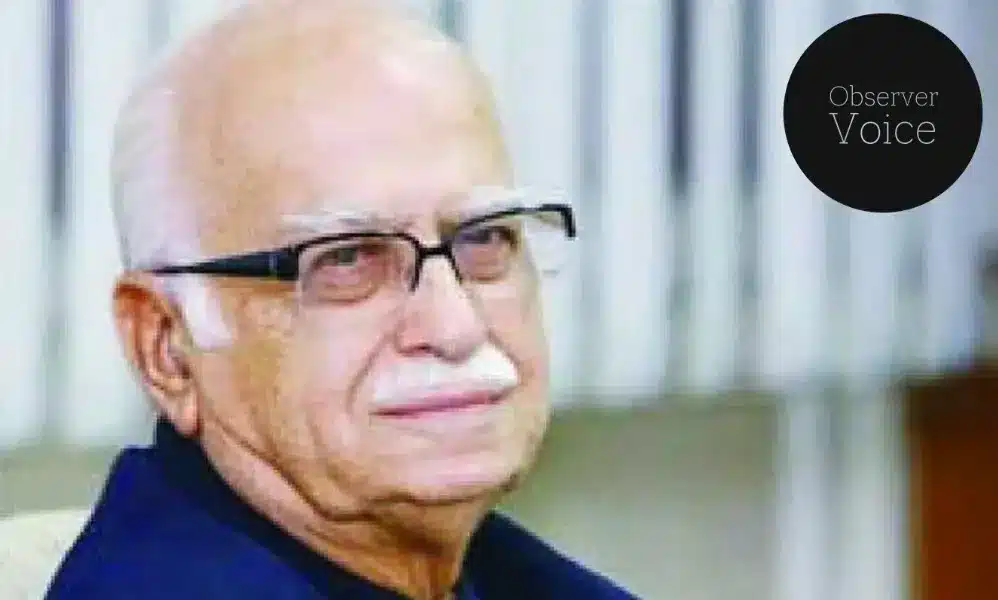Lal Krishna Advani: The Patriarch of Indian Politics

Lal Krishna Advani (8 November 1927) is an Indian politician who served as the 7th Deputy Prime Minister of India from 2002 to 2004.
Life and Career
Lal Krishna Advani was born on 8 November 1927, in Karachi, Bombay Presidency, British India. In his early years, he attended Saint Patrick’s High School in Karachi, Sindh, and then Government College in Hyderabad, Sindh. During the partition, his family moved to Bombay, where he graduated from Bombay University Law College.
His interest in politics began at an early age, and he joined the RSS at 14 as a volunteer. He got involved with the party and realized he was meant for politics. In 1944, he started teaching at Model High School in Karachi. During this time, he also worked for the RSS.
India’s partition in 1947 shattered his life. After partition, he was forced to leave behind his homeland and move to India. Despite being deeply saddened by the partition events, he didn’t get angry. Instead, he believed that it was his duty to work towards building a strong and secular nation and continued with his political work.
In 1947, he became more involved in politics and was RSS Secretary for Alwar, Bharatpur, Kota, Bundi, and Jhalawar.
He met Atal Bihari Vajpayee in 1957 and moved to Delhi to help him. He was Secretary of the Delhi State Jana Sangh from 1958 to 1963.
He served as assistant editor of the ‘Organiser’, a political journal of the Jana Sangh from 1960 to 1967.
He became chairman of the Delhi Metropolitan Council in 1967. In 1970, he was elected to the Indian parliament and in 1972, he became president of the Bhartiya Jana Sangh.
From 1976 to 1982, he was a Rajya Sabha member from Gujarat. The Bhartiya Janata Party (BJP) was founded in the 1970s after Jana Sangh was dissolved. He joined the BJP with Atal Bihari Vajpayee.
He became the General Secretary of the newly formed BJP in 1980. He held this post until 1986 when he became BJP president.
After his guidance and leadership, the BJP grew from strength to strength and won 86 seats in the 1989 parliamentary elections.
He started the Ram Janmabhoomi campaign in the early 1990s, taking part in the Ram Rath Yatra from Somnath to Ayodhya. The Yatra was linked to the Mandir-Masjid dispute centered on the Ram Janmabhoomi-Babri Masjid site in Ayodhya.
In 1997, he started the Swarna Jayanti Rath Yatra to celebrate the Golden Jubilee of India’s Independence by leading Four Yatras named Janadesh Yatras.
He became Home Minister in 1998 under Atal Bihari Vajpayee, who was Prime Minister. He was Deputy Prime Minister of India from 2002 to 2004. He became the Leader of the Opposition after the BJP lost the elections in 2004.
In 2008, Dr. A.P.J. Abdul Kalam released L K Advani’s autobiography, My Country, My Life. In addition to Hindi, Marathi, Kannada, and Urdu, the book was released in six other languages.
In the 2009 parliamentary elections, he was tipped to be the party’s prime ministerial candidate, but he was unable to win.
He’s currently representing Gandhi Nagar in Parliament and is mentoring the next generation of BJP leaders
Award
In 2015 he was awarded the Padma Vibhushan, India’s second-highest civilian honour.
In 2024, he was awarded India’s highest civilian honour, the Bharat Ratna, by the Government of India.
Read More: 7 November: Remembering Bipin Chandra Pal on His Birth Anniversary
Observer Voice is the one stop site for National, International news, Sports, Editor’s Choice, Art/culture contents, Quotes and much more. We also cover historical contents. Historical contents includes World History, Indian History, and what happened today. The website also covers Entertainment across the India and World.

